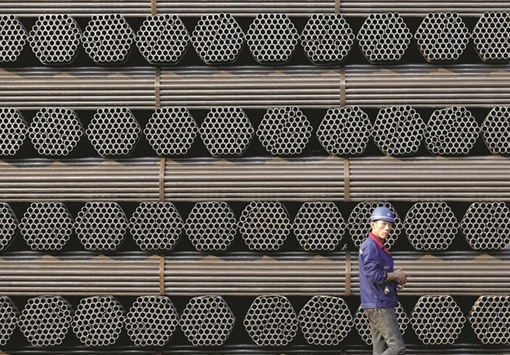Europe’s steelmakers called yesterday for sharply higher anti-dumping tariffs to protect against a flood of cheap Chinese imports, blamed for plunging the future of Britain’s biggest steelworks into doubt.
Steelmakers blamed slow, ineffective action by the European Union for failing to stop other countries, particularly China, from massive steel dumping – exporting their excess production at below-cost prices.
Indian giant Tata announced this week it is putting all or part of its British business up for sale, including the nation’s leading Port Talbot steelworks, because of a global glut, plunging prices and a “significant increase” in cheaper imports to Europe. The Brussels-based European Steel Association representing all steel production in the European Union, which is the second largest steel producer in the world after China, said the time had come for Europe to act.
The US takes just four to five months to deploy anti-dumping duties, compared to 16 months in the European Union, said European Steel Association spokesman Charles de Lusignan. US anti-dumping tariffs are also significantly higher than those in Europe. The US recently levied a duty of 266% on a Chinese steel product while the comparable tariff in Europe was 13%, De Lusignan told AFP.
“The European Union is certainly putting out lots of action plans and it is making all the right noises. The issue is that the methods that can be used to defend against injurious dumping are too slow to deploy and result in measures which are too small to be effective,” De Lusignan said.
“This means that whereas the US vigorously defends against dumping, the EU is seeing its markets drowned out by the effects of pricing pressure from abroad.”
Europe’s steel sector, which has an annual revenue of €166bn ($189bn) and accounts for 1.3% of the bloc’s total economic output, directly employs some 328,000 people, according to the European Commission. Last month, European Union heads of state and government vowed to take strong action to support the industry. Steelmakers say they need that support urgently. Luxembourg-headquartered ArcelorMittal, the world’s biggest steel maker, announced in February it had lost $7.95bn in 2015, blaming deteriorating global prices because of excess production capacity in China.
“If you look at the operating results of steel companies, the level of Chinese exports and the impact on prices in our main markets, it is clear that there is an urgent need for action,” finance director Aditya Mittal told reporters at the time.
Philippe Chalmin, head of the Paris-based Cyclope commodities research institute, said Europe had no comparative advantages in basic steel production.
“There is 300-500mn tonnes of excess steel capacity in the world. The Chinese are suffering, too, but they have exported their problems,” he told AFP.
Though worldwide steel production fell by 2.8% in 2015, China’s share of that edged higher to 49.5% from 49.3%. Steel prices may have hit the bottom already, said Chalmin. “But you should not expect too much. It is a bottom that could last quite a long time,” he added.
In Britain, where Tata Steel’s operations employ 15,000 people, the threat to the steel industry has provoked heated political debate. Prime Minister David Cameron said the country is doing “everything it can” but he dismissed opposition calls for the loss-making industry to be nationalised. Following Tata Steel’s announcement, analysts at Hamburg-headquartered investment bank Berenberg said they believed the Indian group’s British steel assets could be merged with those of Germany’s ThyssenKrupp Steel Europe.

A worker walks past a pile of steel pipe products at the yard of the Youfa plant in Hebei province. The Brussels-based European Steel Association representing all steel production in the European Union, which is the second largest steel producer in the world after China, said the time had come for Europe to act against massive steel dumping by China.
